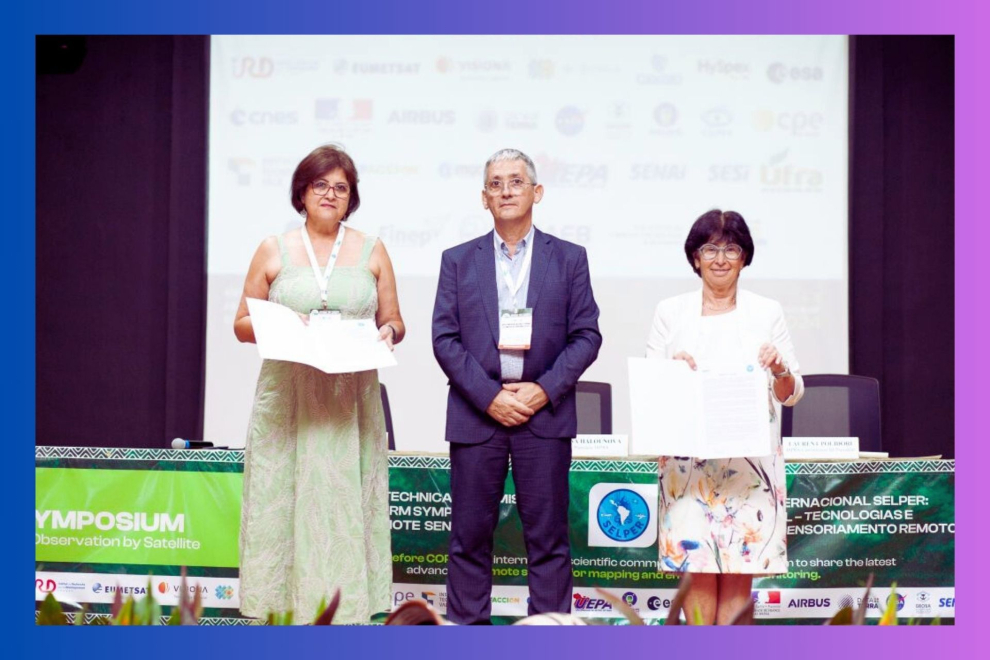Během závěrečného ceremoniálu sympozia ISPRS-SELPER, které se konalo v Brazílii v listopadu 2024, podepsaly prezidentky obou vědeckých společností, Lena Halounová a Hilcéa Ferreira, Belémskou deklaraci jménem mezinárodní komunity pro dálkový průzkum Země, kterou obě organizace zastupují.
Tato deklarace vyjadřuje obavy z degradace naší planety a zdůrazňuje závazek implementovat technologie dálkového průzkumu pro podporu rozhodování, která mají za cíl snížit tuto degradaci a její dopady, přičemž připomíná, že k tomu jsou zapotřebí dlouhé časové řady dat, dodržování standardů otevřené vědy a investice do výzkumu a vývoje.
Tato deklarace představuje prohlášení a plán pro zastupovanou vědeckou a profesionální komunitu v souvislosti s příští konferencí smluvních stran (COP), která se uskuteční v roce 2025 v Belému.
Původní znění Belémské deklarace
BELÉM DECLARATION
The International Society for Photogrammetry and Remote Sensing (ISPRS) is a non-governmental organization dedicated to fostering international cooperation for the advancement of photogrammetry, remote sensing, spatial information sciences, and their applications. Established in 1910 in Vienna, Austria, ISPRS organizes its initiatives through various Technical Commissions and Committees.
The Sociedad Latinoamericana en Percepción Remota y Sistemas de Información Espacial (SELPER) is a non-profit, international technical-scientific association comprising National Chapters from multiple Latin American countries, along with Special Chapters from nations with advanced remote sensing technologies that support the Society’s activities.
From 2-8 November 2024, the international remote sensing scientific community convened in Belém, Brazil, for a conference featuring the ISPRS Technical Commission III (Remote Sensing) Mid-term Symposium, the XXI SELPER Symposium, and the Geoinformation for Disaster Management (Gi4DM) workshop. This major event brought together experts and participants from 50 countries, showcasing advances in Earth observation imagery and data processing methods, while highlighting both their potential and their limitations, particularly as applied to environmental and global change science, and for environmental management.
Scientific contributions in the field of remote sensing presented at the conference demonstrated degradation of terrestrial and marine ecosystems; escalating climate change effects such as wildfires, floods and droughts; and population migrations driven by poverty and conflict, among other human-induced activities. Amazonia, the conference’s host region, serves as a poignant example, grappling with deforestation, gold mining and other environmental disturbances.
Satellite and airborne remote sensing often represent the sole means of acguiring information of extensive and inaccessible areas. Remote sensing, grounded in rigorous scientific methods, provides objective and reliable information and thus also contributes to combat the spread of fake news.
In this context, the international remote sensing community, gathered in Belém under the auspices of ISPRS and SELPER, makes the following declarations:
- We express our concern regarding the degradation of the global environment and acknowledge our responsibility, given our access and ability to analyze Earth observation data.
- We affirm the necessity of continuous access to full, free and open, high-guality Earth observation data that serves as a crucial input for scientific research, operational geoinformation production and well-informed policy-making.
- We emphasize the need to improve methodologies and technologies for continuous monitoring of the planet, ensuring the availability of consistent, long-term time series to detect and interpret changes driven by human activities such as climate change, and to assess the effectiveness of mitigation and adaptation policies.
- We advocate for traceability in the acguisition and processing of Earth observation data, ensuring transparency and reproducibility of methods and algorithms in line with Open Science standards. We also commit to evaluating the guality of Earth observation data and products, and to assessing the reliability of derived products for environmental monitoring.
- We pledge to prioritize the use of remote sensing and Earth digital twins for the benefit of the planet and humanity, in alignment with the UN Sustainable Development Goals (UN-SDGs).
- We urge political authorities to recognize that exploiting the full potential of remote sensing reguires corresponding investments and support in both material and human resources.
Belém, 8 November 2024
Hilcéa Santos Ferreira
President, SELPER
Lena Halounová
President, ISPRS
zdroj: ISPRS e-bulletin 4/2024




